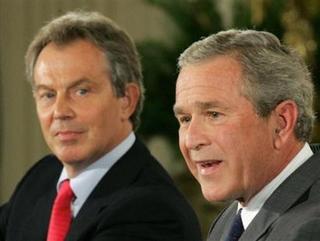Give a man a fish and you feed him for a day. Teach a man to fish and you feed him for a lifetime.
 Bush & Blair – allies now in war against the press: Remember the plan George – we’re announcing ways to turn African swords into ploughshares, not trying to justify why we’re spending $400 billion for war in Iraq and only $40 billion to end poverty.
Bush & Blair – allies now in war against the press: Remember the plan George – we’re announcing ways to turn African swords into ploughshares, not trying to justify why we’re spending $400 billion for war in Iraq and only $40 billion to end poverty.
During their White House press conference on Tuesday – which was dominated by questions about aid to Africa – President Bush distinguished himself from UK Prime Minister Tony Blair by extolling the virtues of self-help, business enterprise and trade over indiscriminate aid as the best way to make poverty history.
But it was almost surreal to watch Bush struggling to defend the unparalleled and unprecedented amount America gives in aid to poor countries ($19 billion or 25% of all funds donated annually plus the $674 million he announced for emergency famine relief). Indeed, despite America’s unassailable generosity in this respect, Bush seemed positively apologetic as he explained:
“I think one of the things that many African nations have come to discover is that through trade they can develop a more hopeful society rather than through aid….Nobody wants to give money to a country that’s corrupt, where leaders take money and put it in their pocket. No developed nation is going to want to support a government that doesn’t take an interest in their people, that doesn’t focus on education and health care.”
Of course, no reasonable person can argue with that! After all, despite the billions that have been thrown at problems in Africa over decades, the vast majority of Africans are more dependent on foreign aid today than ever before. And corrupt and ruthless African governments have invariably been the only pestilence impeding the development of their country and their people’s pursuit of happiness.
In fact, no problem demonstrates this African pathology more poignantly than the persistent famine in Ethiopia. Recall how the entire world was stirred to contribute to the 1985 Live Aid fund that raised over $240 million for famine relief in that country. Yet, alas, we now know that the government of Haile-Mariam Mengistu and its notoriously ruthless Derg militia misappropriated much of the aid for political and personal use without any regard for the more than 1 million Ethiopians who ended up dying from starvation.
Incredulously, Live Aid had so little impact that there was no hint of irony when Ethiopia’s current Prime Minister Meles Zenawi warned recently that without an immediate infusion foreign aid:
“…if the 1984 famine was a nightmare, then this will be too ghastly to contemplate.”
But the Ethiopians are hardly alone in their dire straits. Because where genocidal famine looms in Ethiopia, it is already a fact of life in Darfur, Sudan. And, here again, this pestilence exists entirely because the (predominantly Arab-Muslim) Sudanese government and its Janjaweed militia have systematically prevented black Christian farmers from growing or receiving food as a guerilla tactic in their inhumane campaign of ethnic cleansing in Darfur.
Yet, remarkably enough, Bush is not winning too many converts amongst leaders of G8 donor nations with his insistence that strict conditions – like good governance, rooting out corruption, upholding human rights, and adherence to the rule of law – should govern the granting of (non-emergency) foreign aid. Indeed, except for his longsuffering ally, UK Prime Minister Tony Blair, most European leaders actually scoffed at his Millennium Challenge Account initiative which delineates the comprehensive conditions countries must satisfy before receiving aid.
Bush should be encouraged, however, by the fact that his policy on aid to Africa not only reflects the wisdom of the Chinese proverb above but also emulates the plan for black economic development formulated over 100 years ago by black power activist Booker T. Washington who admonished that:
“…if every member of the race should strive to make himself the most indispensable man in his community, and to be successful in business, however humble that business might be, he would contribute much towards smoothing the pathway of his own and future generations.”
Ironically, Bush’s detractors amongst G8 leaders suggest that the conditions outlined in his Millennium Challenge Account are too onerous and inconsistent with humanitarian aid. (Even though those conditions are aimed not only at helping Africans out of their current straits but also at building the infrastructure and institutions that will enable them to help themselves for genertions to come.)
Nevertheless, at the very least, it behooves Bush’s critics to appreciate that – in addition to providing yet more aid and canceling Africa’s crippling debt – they have a moral and fiduciary duty to ensure that the aid reaches those most in need; so that, 20 years from now, poverty is not still as much a blight in Africa as famine remains in Ethiopia today.
News and Politics
Leave a Reply
You must be logged in to post a comment.